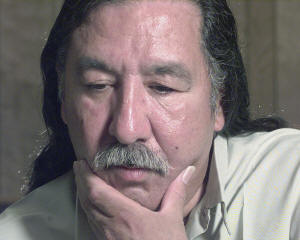Leonard Peltier to be released from prison following sentence
commutation in FBI killings
 Send a link to a friend
Send a link to a friend
 [February 18, 2025]
By GRAHAM LEE BREWER [February 18, 2025]
By GRAHAM LEE BREWER
Indigenous activist Leonard Peltier is set to be released from a Florida
prison Tuesday based on former President Joe Biden having commuted his
life sentence for the 1975 killings of two FBI agents, a decision that
elated Peltier's supporters while angering law enforcement officials who
believe in his guilt.
For nearly half a century, Peltier’s imprisonment has symbolized
systemic injustice for Native Americans across the country who believe
in his innocence. The decision to release the 80-year-old to home
confinement was celebrated by supporters.
“He represents every person who’s been roughed up by a cop, profiled,
had their children harassed at school,” said Nick Estes, a professor of
American Indian Studies at the University of Minnesota and a member of
the Lower Brule Sioux Tribe who has advocated for Peltier’s release.
But the last-minute move as Biden was leaving office also prompted
criticism from those who say Peltier is guilty, including former FBI
Director Christopher Wray, who called him “a remorseless killer” in a
private letter to Biden that was obtained by The Associated Press.
“Granting Peltier any relief from his conviction or sentence is wholly
unjustified and would be an affront to the rule of law,” Wray wrote.
The commutation was not a pardon for crimes committed, something that
Peltier’s advocates have hoped for since he has always maintained his
innocence.
Peltier, an enrolled member of the Turtle Mountain Band of Chippewa in
North Dakota, was active in the American Indian Movement, which
beginning in the 1960s fought for Native American treaty rights and
tribal self-determination.

The group grabbed headlines in 1969, when activists occupied the former
prison island of Alcatraz in the San Francisco Bay, and again in 1972,
when they presented presidential candidates with a list of demands
including the restoration of tribal land. After they were ignored, they
seized the headquarters of the Bureau of Indian Affairs.
From then on the group was subject to FBI surveillance and harassment
under a covert program that sought to disrupt activism and was exposed
in 1975.
Peltier's conviction stemmed from a confrontation that same year on the
Oglala Sioux Indian Reservation in Pine Ridge, South Dakota, in which
FBI agents Jack Coler and Ronald Williams were killed. According to the
FBI, the agents were there to serve arrest warrants for robbery and
assault with a dangerous weapon.
Prosecutors maintained at trial that Peltier shot both agents in the
head at point-blank range. Peltier acknowledged being present and firing
a gun at a distance, but said he fired in self-defense. A woman who
claimed to have seen Peltier shoot the agents later recanted her
testimony, saying it had been coerced.
[to top of second column]
|

American Indian activist Leonard Peltier speaks during an interview
at the U.S. Penitentiary at Leavenworth, Kan., April 29, 1999. (Joe
Ledford/The Kansas City Star via AP, File)

He was convicted of two counts of first-degree murder and given two
consecutive life sentences.
Two other movement members, co-defendants Robert Robideau and Dino
Butler, were acquitted on the grounds of self-defense.
Peltier was denied parole as recently as July and was not eligible
to be considered for it again until 2026.
“Leonard Peltier’s release is the right thing to do given the
serious and ongoing human rights concerns about the fairness of his
trial, his nearly 50 years behind bars, his health and his age,"
said Paul O’Brien, executive director with Amnesty International USA
in a statement. "While we welcome his release from prison, he should
not be restricted to home confinement.”
Prominent Native American groups like the National Congress of the
American Indian have called for Peltier's release for decades, and
Amnesty International considered him a political prisoner. Prominent
supporters included South African Archbishop Desmond Tutu, civil
rights icon Coretta Scott King, actor and director Robert Redford
and musicians Pete Seeger, Harry Belafonte and Jackson Browne.
Generations of Indigenous activists and leaders lobbied multiple
presidents to pardon Peltier. Former Interior Secretary Deb Haaland,
a member of the Pueblo of Laguna and the first Native American to
hold the secretary's position, praised Biden's decision.
“I am grateful that Leonard can now go home to his family,” she said
Jan. 20 in a post on the social platform X. “I applaud President
Biden for this action and understanding what this means to Indian
Country.”
As a young child, Peltier was taken from his family and sent to a
boarding school. Thousands of Indigenous children over decades faced
the same fate, and were in many cases subjected to systemic
physical, psychological and sexual abuse.
“He hasn’t really had a home since he was taken away to boarding
school,” said Nick Tilsen, who has been advocating for Peltier's
release since he was a teen and is CEO of NDN Collective, an
Indigenous-led advocacy group based in South Dakota. “So he is
excited to be at home and paint and have grandkids running around.”
All contents © copyright 2025 Associated Press. All rights reserved
 |